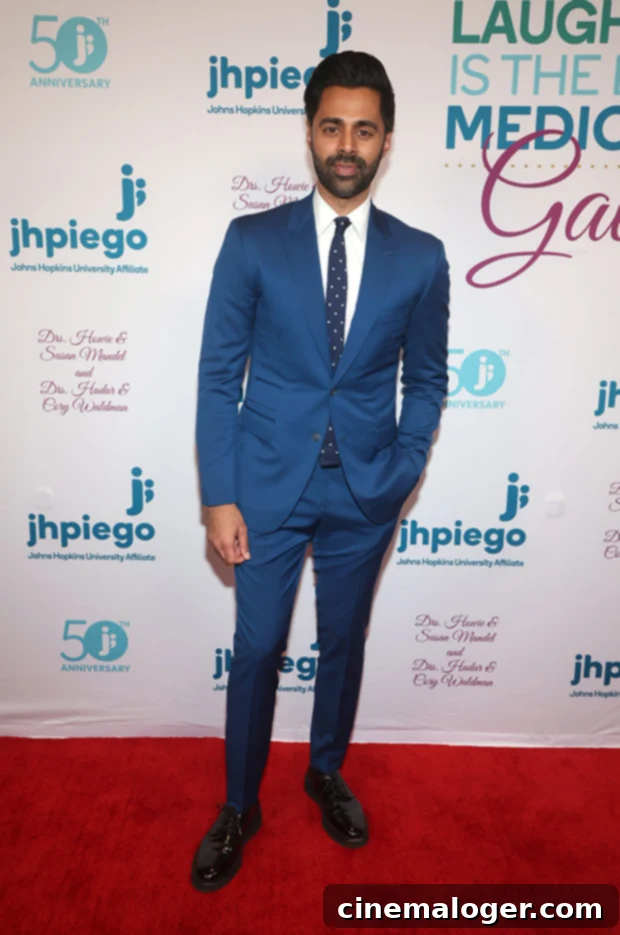Hasan Minhaj Responds to ‘Misleading’ New Yorker Article: Unpacking the Controversy Over His Stand-Up’s ‘Emotional Truths’
Comedian and former host of the critically acclaimed “Patriot Act,” Hasan Minhaj, found himself at the center of a significant media storm following a September profile published by The New Yorker. The highly controversial article alleged that Minhaj fabricated or substantially exaggerated key anecdotes within his popular stand-up comedy specials. In response, Minhaj, 38, released a comprehensive and detailed video on Thursday, October 26, via The Hollywood Reporter, aiming to provide crucial context and transparency regarding the stories highlighted in The New Yorker piece.
Minhaj’s video serves as a direct rebuttal to the claims, asserting that the original article was “misleading” and failed to accurately represent his life story. He stressed that he had, in fact, supplied The New Yorker with supplementary details and corroborating materials, which he claims were inexplicably omitted from the final publication. “There were omissions and factual errors in The New Yorker article that misrepresented my life story, so I wanted to give people the context and materials I provided The New Yorker with full transparency,” Minhaj stated, emphasizing his commitment to setting the record straight for his audience and the public.
Addressing the timing of his response, Minhaj explained that he intentionally took a “beat” amidst the ongoing global conflicts, particularly the war in the Middle East, allowing himself time to “process” the intense scrutiny and public reaction. He also extended a sincere apology to any fans who felt “betrayed or hurt” by the revelations, acknowledging the profound impact of such allegations on his relationship with his audience. “I just want to say to anyone who felt betrayed or hurt by my stand-up, I am sorry. I made artistic choices to express myself and drive home larger issues affecting me and my community, and I feel horrible that I let people down,” Minhaj expressed, while concurrently reaffirming his belief that The New Yorker profile profoundly misrepresented both his comedic craft and his personal character. He unequivocally stated, “The truth is, racism, FBI surveillance and the threats to my family happened. And I said this on the record.” This assertion underscores his argument that the core themes of his comedy specials are rooted in genuine experiences, even if some narrative details were adjusted for comedic effect.
Prior to the release of Minhaj’s video response on The Hollywood Reporter, The New Yorker had already publicly defended its investigative piece. A spokesperson for the magazine affirmed their commitment to the article’s accuracy, stating, “This piece was carefully reported and fact-checked, and includes Hasan Minhaj’s perspective at length. We can’t comment on the specifics of his claims having not seen the video.” This initial stance set the stage for a prolonged public debate about journalistic integrity versus artistic license in comedy.
Following the release of Minhaj’s detailed video, The New Yorker issued an updated statement, obtained by HollywoodLife, reiterating its unwavering support for the original story. The magazine’s spokesperson elaborated, “Hasan Minhaj confirms in this video that he selectively presents information and embellishes to make a point: exactly what we reported. Our piece, which includes Minhaj’s perspective at length, was carefully reported and fact-checked. It is based on interviews with more than twenty people, including former ‘Patriot Act’ and ‘Daily Show’ staffers; members of Minhaj’s security team; and people who have been the subject of his standup work, including the former F.B.I. informant ‘Brother Eric’ and the woman at the center of his prom-rejection story. We stand by our story.” This robust defense highlights the extensive research and multiple sources cited by the magazine, aiming to validate their reporting amidst Minhaj’s counter-claims.
In his video, Hasan Minhaj meticulously addressed three specific stories that were central to The New Yorker‘s scrutiny. One of the most prominent narratives concerned his high school prom experience, where he recounted asking a white girl (referred to by the alias “Bethany”) to prom, only for her mother to allegedly tell him they didn’t want to take family photos with a “brown boy.” Minhaj clarified that while the hurtful conversation indeed took place, it occurred a few days before prom, not on the day itself as depicted in his stand-up. To substantiate his account, he played audio excerpts of himself relaying this precise detail to The New Yorker reporter during their interviews, suggesting that this nuance was overlooked or intentionally omitted. Furthermore, Minhaj displayed excerpts of emails and other exchanges with “Bethany,” which he claimed corroborated his version of events and his consistent efforts to shield her identity. This stood in contrast to The New Yorker‘s article, which claimed she had been a victim of doxing and death threats, implying that Minhaj’s narrative had inadvertently put her in harm’s way. Minhaj’s evidence aimed to demonstrate his care and responsibility in protecting individuals involved in his stories, even as he adapted the narrative for comedic impact.

The other contentious stories that Minhaj addressed included an incident where he claimed an envelope containing white powder, presumed to be anthrax, spilled on his daughter. This terrifying event, as he originally presented it, underscored the dangers faced by his family due to his outspoken political commentary. He also detailed a separate incident where he alleged a run-in with law enforcement after being racially profiled, a common theme in his stand-up that resonates deeply with his audience and community. For these narratives, Minhaj clarified that while the core events and emotional impact were authentic, some details might have been amplified or compressed for dramatic effect within the context of his comedic storytelling.
While Minhaj openly apologized for “embellishing” certain elements within his stand-up routines, he underscored a critical distinction between the various forms of comedy he performs. He elucidated the difference between the rigorous fact-checking protocols applied to his political news shows, such as “Patriot Act” and “The Daily Show,” and the more narrative-driven style of his Netflix comedy specials. “In political comedy, facts come first. In comedic storytelling, emotions come first. That is what I said, and that is what I meant,” he passionately explained. This distinction is central to his defense, arguing that while political commentary demands strict adherence to factual accuracy, personal storytelling in stand-up often prioritizes the emotional truth and the broader message over absolute literalism. He suggested that The New Yorker‘s article blurred these lines, applying journalistic standards designed for factual reporting to a creative art form where personal narratives are inherently shaped for impact. Towards the conclusion of his video, Minhaj pledged to be more “thoughtful” and transparent about how he crafts his stories in the future, signaling a commitment to evolve his comedic approach while maintaining his unique voice.
The controversy surrounding Hasan Minhaj and The New Yorker has ignited a broader discussion within media and entertainment circles about the boundaries of artistic license, the ethics of journalism, and the expectations placed upon comedians who blend personal narrative with social and political commentary. It highlights the delicate balance between entertaining an audience, conveying powerful messages, and ensuring factual fidelity, especially when those messages touch on sensitive and significant societal issues like racism and surveillance. The extensive back-and-forth between Minhaj and The New Yorker serves as a compelling case study on how public figures manage their narratives in an age where information, and misinformation, spreads rapidly.
This story has been updated to include The New Yorker’s updated statement, reflecting the ongoing developments in this high-profile media dispute.
